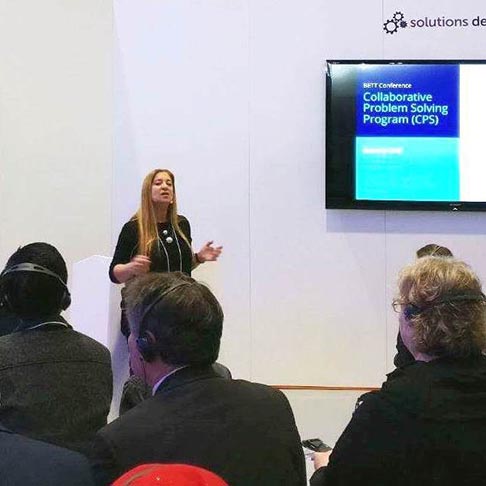How can schools bridge the gap between “21st century skills” – such as leadership, adaptability, responsibility and cross-cultural skills – and scientific and technical knowledge?
World ORT Kadima Mada Chief Pedagogical Officer Iris Wolf has been at BETT, Britain’s annual trade show for information technology used in education, offering one solution which has been enjoyed by hundreds of ORT students from Mexico, through Europe, to Israel:
“It’s an online, interactive collaborative problem solving programme in the field of ecology – and we’re opening it up to the world,” she said.

Positive feedback: Iris Wolf’s presentation opened people’s eyes to the possibilities of online collaboration
Initially developed in collaboration with Pearson’s Center for NextGen Learning & Assessment and Israel’s Ministry of Education, the programme is now being made available to non-ORT schools worldwide under the name CPS (Collaborative Problem Solving).
Positive feedback: Iris Wolf’s presentation opened people’s eyes to the possibilities of online collaboration.
The programme sees teenage students paired together with peers from other countries during science lessons. Together, over a period of eight weeks, they take up the role of scientists sent to the fictitious town of Animalia to find out why fish in the rivers are dying.
The students have to use their understanding of scientific concepts from pH and oxygen saturation to algae physiology and ecosystems. Each one is exposed to a piece of the puzzle, and they have to work together, sharing their knowledge, in order to come up with a solution.
“One of the ways we make it realistic is by presenting them with pieces of information which are sometimes misleading, irrelevant or contradictory. They have to separate the wheat from the chaff,” Ms Wolf said.
Dr Yigal Rosen has been instrumental in developing the programme from the beginning. Now Senior Research Scientist in The Vice Provost for Advances in Learning (VPAL) at Harvard University, Dr Rosen says Animalia comes at a time when educational success is no longer about reproducing content knowledge, but about applying that knowledge in novel situations.

Dr Yigal Rosen has been involved in the development of the World ORT Kadima Mada programme from the beginning.
“For students to be successful in life and the workplace, we need to expose them to long-term projects, help them apply knowledge to real-world problems, and ask them to use technology in ways that are more like how people use it in the real world,” he said.
Ms Wolf added: “Collaborative problem solving is seen as so important that the OECD pushed for its inclusion in the Programme for International Student Assessment (PISA) alongside science, maths and literacy. CPS nurtures the ability to solve problems in concert with others by integrating multicultural bridging, 21st century skills and global competence using interactive digital platforms that simulate the outside world.”
The students’ participation in the Animalia programme is recorded so that all their interactions and personal feedback is available for teachers to review and evaluate the quantity and quality of their collaboration.
“It’s a step towards incorporating the acquisition of learning skills with social skills between students from diverse cultures and communities globally. It’s very exciting – and the feedback I received at BETT reflects that,” said Ms Wolf. “Some liked the topic, others liked the multicultural element. But for many this was the first time they had really thought about this important aspect: how can we evaluate and assess children who are involved in collaborating.”





